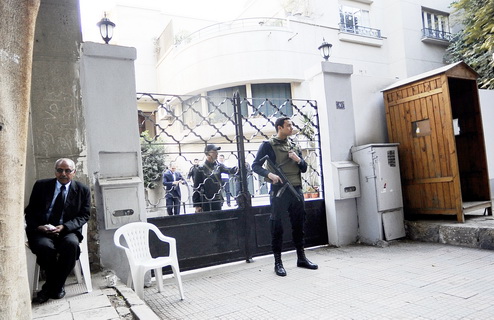
(AFP PHOTO / HO/ AL-JAZEERA)
Human rights watchdog Amnesty International has called on the Egyptian government to free hunger-striking Al Jazeera Arabic journalist Abdullah Elshamy, who was moved to solitary confinement in the notorious Al-Aqrab section of Cairo’s Tora Prison last Monday.
In a statement released Friday, Amnesty International demanded that Elshamy, described as a “prisoner of conscience,” be released immediately and unconditionally, receive any necessary attention, and that reports of “torture and other ill-treatment” be investigated immediately.
Elshamy, arrested over nine months ago at the violent clearing of the pro-Mohamed Morsi sit-in at Rabaa El-Adaweya Mosque, has yet to be brought up on formal charges. Elshamy has been on hunger strike for 117 days, and recent medical tests revealed that his health is deteriorating rapidly.
Dr Mohamed Ussama Al Homsi, who reviewed Elshamy’s medical tests, said Elshamy “has started to have impaired liver and kidney function” indicating organ failure, and that he could “die within a few days,” reported Al Jazeera English.
In a 15 May statement, Elshamy’s brother Mosa’ab Elshamy claimed that Abdullah was moved to solitary confinement in an effort for prison authorities to more easily attempt to force feed Elshamy.
Last week 13 members of the United States Congress sent a letter to interim President Adly Mansour demanding the release of all journalists detained in Egypt.
Signee Jim Moran, a democrat representative from Virginia, told Al Jazeera English that the US has failed to remedy the ongoing crackdown against media in Egypt.
“I wish the US had put pressure yesterday and today… I think the situation is going to become evermore dire and I think that Egypt is going to become more repressive,” said Moran.
In addition to Elshamy, three journalists working for Al Jazeera’s English network have been detained since being arrested on 29 December. Cairo bureau chief Mohamed Fadel Fahmy, correspondent Peter Greste, and producer Baher Mohamed are currently standing trial for spreading false news, and are accused of “creating a terrorist media network”.
The arrests and detention of journalists in Egypt has garnered international ire. The US State Department called the charges against the Al Jazeera English journalists “spurious”, while the White House, the European Union, the United Nations and the Australian government have all expressed their unequivocal condemnation, and called for the journalists’ release.
Egypt has experienced an increasingly severe crackdown on voices of dissent. The Committee to Protect Journalists has ranked Egypt the third most dangerous country for journalists after Syria and Iraq. The country ranked 159th out of 180 in the 2013 Reporters Without Borders “Press Freedom Index”.
Al Jazeera has unequivocally denied any wrongdoing by its journalists.


